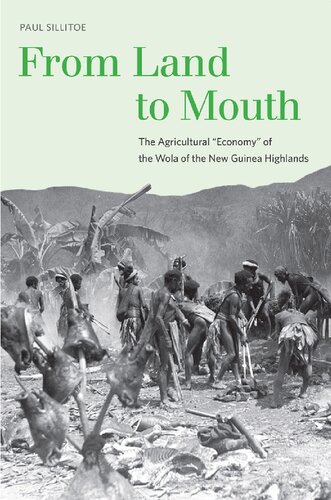

Most ebook files are in PDF format, so you can easily read them using various software such as Foxit Reader or directly on the Google Chrome browser.
Some ebook files are released by publishers in other formats such as .awz, .mobi, .epub, .fb2, etc. You may need to install specific software to read these formats on mobile/PC, such as Calibre.
Please read the tutorial at this link. https://ebooknice.com/page/post?id=faq
We offer FREE conversion to the popular formats you request; however, this may take some time. Therefore, right after payment, please email us, and we will try to provide the service as quickly as possible.
For some exceptional file formats or broken links (if any), please refrain from opening any disputes. Instead, email us first, and we will try to assist within a maximum of 6 hours.
EbookNice Team

Status:
Available4.6
41 reviewsAmong the Wola people of Papua New Guinea, our category economy is problematic. Distribution is unnecessary; the producers of everyday needs are the consumers: produce goes largely from land to mouth with no implication that resources are scarce. Yet transactions featuring valuable things -- which are scarce -- are a prominent aspect of life, where sociopolitical exchange figures prominently. The relationship - or rather the disconnection - between these two domains is central to understanding the fiercely egalitarian political-economy. In this detailed investigation of a Highland New Guinea agricultural economy and acephalous political orderthe most thorough inquiry into such a tropical subsistence farming system ever undertakenesteemed anthropologist Paul Sillitoe interrogates the relevance of key economic ideas in noncapitalist contexts and challenges anthropological shibboleths such as the gift. Furthermore, he makes a reactionary-cum-innovative contribution to research methods and analysis, drawing on advances in information technology to manage large data sets.
Over a span of more than three decades, Sillitoe has compiled a huge body of ethnography, gaining unprecedented insights into Highlands social, economic, and agricultural arrangements. He uses these here to illuminate economic thought in nonmarket contexts, advancing an integrated set of principles underpinning a stateless-subsistence order comparable to that of economists for the state-market. Sillitoes insights have implications for economic development programs in regions where capitalist assumptions have limited relevance, following his advocacy of development interventions more respectful of existing social orders.